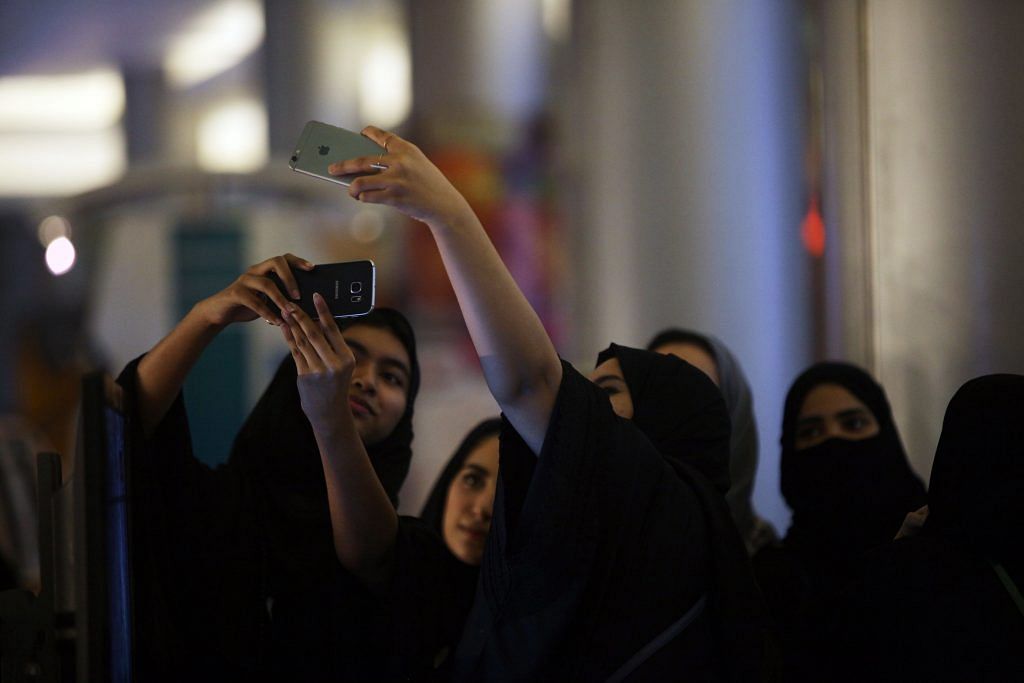As post-oil Saudi Arabia undertakes transformative changes, there is a lesson for not only the other Muslim countries, but also for India.
In modern memory, Saudi Arabia is widely known for promoting Islamic orthodoxy. But, a series of policies announced by the Saudi royalty recently reveal a bold intention to roll back orthodox Islam. On 11 December, the Saudi government decided to open cinemas by March. It aims to open 2,000 screens in 300 multiplexes by 2030.
This decision will have far-reaching implications not only for Saudi Arabia, but also for the wider world of Sunni Islam. The natural question that arises from this is: Can reform come to the Muslim world without the attendant upgrades in orthodox Islamic theology?
From Indonesia to Bangladesh and Pakistan, from Saudi Arabia to Egypt and Tunisia, the dominant narrative in post-9/11 years has been one of hardening Islam. But in most Muslim countries, Islamic clerics cannot win the popular vote, but they exert street influence. Now, these clerics are likely to toe the new government line in Saudi Arabia even if they don’t fully agree. Government leaders in these countries are under pressure to respond to the educational, economic and political aspirations of youth, which is magnified in the digital era.
In September, Saudi Arabia allowed women to drive. Women have also been permitted to enter male-only stadiums to watch soccer. In post-9/11 years, Saudi Arabia has granted its citizens the right, to men first and subsequently to women, to contest and vote in municipal elections. These decisions are part of the Crown Prince Mohammed bin Salman’s Vision 2030 to reduce the Saudi dependence on oil, create jobs for youths and reshape the identity of Saudi Arabia.
As the Western nations like America shift to newer sources of energy, an existential crisis engulfs oil-dependent nations like Saudi Arabia – a key reason for the course correction.
“We are simply reverting to what we followed – a moderate Islam open to the world and all religions. Seventy per cent of the Saudis are younger than 30, honestly we won’t waste 30 years of our life combating extremist thoughts, we will destroy them now and immediately,” the 32-year old Crown Prince said. If he can retain his grip on power, he will go on to rule for over half a century and transform Saudi Arabia to a moderate path.
But this has not come out of the blue. Saudi King Abdullah, who reigned from 2005 till his death in 2015, began far-reaching reforms, starting inter-faith dialogue after meeting Pope Benedict XVI, recognising rival theological schools, removing police chief for human rights abuses, sacking the orthodox chief of the supreme judicial council, appointing a woman as deputy minister for girls’ education.
The Kingdom of Saudi Arabia, established in 1932, embarked on the path of a puritan, anti-women and orthodox Islam due to Muhammad ibn Abd al-Wahhab (1703-1792), a theologian who differed with Sufi Islam and rejected bid’a, or innovations, in religion. Al-Wahhab’s daughter was married into the royal family. After the discovery of oil in 1938, Saudis began sponsoring Islamic clerics from the Sunni world and promoted the puritan brand of faith.
In the post-9/11 era, analysts blamed this Wahhabi Islam brand for armed jihad.
Such concerns are valid. These Saudi-sponsored clerics took over the social mainstream in the Sunni world and created a theological consensus which benefits modern-day jihadism. Islamic clerics who issue fatwas (edicts) against Al-Qaeda and the Islamic State, do not actually reject theological principles due to which these jihadi groups thrive. For example, almost all sects of Islam advocate beheadings for blasphemy.
This theological consensus works in two ways. One, the clerics do not question the theological principles. Two, Muslim intellectuals in the media do not challenge the clerics’ ideas.
For instance, in 2015, about 1,050 Islamic scholars in India issued a 15-volume fatwa against the Islamic State. While the Western press carried this news prominently, in India most Urdu newspapers shunned this report, displaying their reluctance to go against the prevailing theological consensus. In fact, Urdu newspapers in India have openly justified jihadi ideas, including beheadings of Muslims leaving Islam.
It is this theological consensus which is now under challenge from the reformist Saudi leaders. Islamic clerics in Pakistan and India, dependent on Saudi money for their survival, have not publicly spoken against the new reforms, though they must be worried.
A key lesson of these new Saudi policies is that reform among Muslims need not wait for Islam to change first. Governments must initiate policies that counter puritanism, orthodoxies and extremism. This is something India should build on. Instead of organising a Sufi conference, our government could have conducted mini-mathematics Olympiads in madrassas. This could have started a revolution of minds.
Tufail Ahmad is Senior Fellow for Islamism and Counter-Radicalization Initiative at the Middle East Media Research Institute, Washington DC. He tweets @tufailelif
